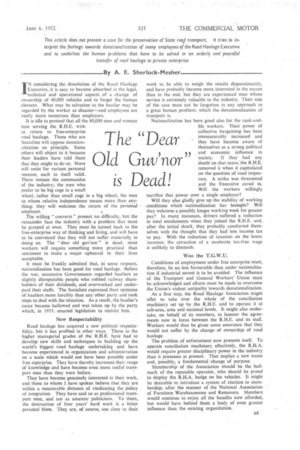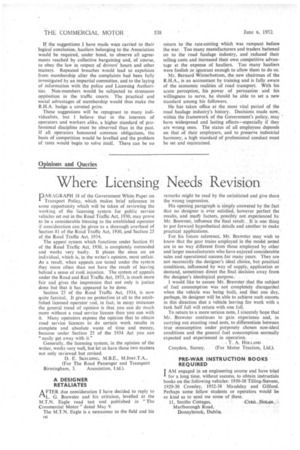This article does not present a case for the preservation
Page 45

Page 46

If you've noticed an error in this article please click here to report it so we can fix it.
of State road transport. It tries to interpret the feelings towards denationalization of many employees of the Road Haulage Executive and to underline the human problems that have to be solved in an orderly and peaceful transfer of road haulage to private enterprise
By A E. Sherlock-Mesher
IN considering the dissolution of the Road Haulage Executive, it is easy to become absorbed in the legal, technical and 'operational aspects of a change of ownership of 40,000 vehicles and to forget the human element. What may be salvation to the haulier may be regarded by the worker as disaster—and employees are vastly more numerous than employers.
It is idle to pretend that all the 80,000 men and -women now serving the R.H.E. wish to return to free-enterprise road haulage. Those whp are Socialists will oppose denationalization on principle. Some others will object to it because their leaders have told them that they ought to do so. More will resist for various personal reasons, each in itself valid. There remain the commandos of the industry; the men who prefer to be big cogs in a small wheel, rather than small cogs in a big wheel; the men to whom relative independence means more than anything: they will welcome the return of the personal employer. .
The willing " converts " present no difficulty, but the remainder face the industry with a problem that must be grasped at once. They must be turned back to the free-enterprise way of thinking and living, and will have to be convinced that they will not suffer materially in doing so. The "dear old guv'nor " is dead; most workers will require something more practical than sentiment to make a major upheaval in their lives acceptable. , It must be frankly admitted that, in some respects. nationalization has been good for road haulage. Before the war, successive Governments regarded hauliers as slightly disreputable people who robbed railway shareholders of their dividends, and overworked and underpaid their staffs. The Socialists expressed their opinions of hauliers more forcibly than any other party and took steps to deal with the situation. As a result, the haulier's cause became hallowed and was taken up by the party which, in 1933, enacted legislation to restrict him.
New Respectability Road haulage has acquired a new political respectability, but it has profited in other ways. Those in the higher managerial grades of the R.H.E. have had to develop new skills and techniques in building up the world's biggest road haulage undertaking and have become experienced in organization and administration on a scale which would not have been possible under free enterprise. They have thereby increased their range of knowledge and have become even more useful transport men than they were before.
They have become genuinely interested in their work, and those to who'rn I have spoken believe that they are within a measurable distance of vindicating the policy of integration. They have said so as professional transport men, and not as amateur politicians. To them, the destruction of four years' hard work is a bitter personal blow. They are, of course, too close to their
work to be able to weigh the results dispassionately, and have probably become more interested in the means than in the end, but they are experienced men whose service is extremely valuable to the industry. Their side pf the case must not be forgotten in any approach to a great human problem, which the denationalization of transport is.
Nationalization has been good also for the rank-andfile workers. Their power of collective bargaining has been immeasurably increased and they have become aware of themselves as a strong political and economic influence in society. If they had any doubt on that score, the R.H.E. removed it when it capitulated on the question of road inspectors. A strike was threatened and the Executive caved in. Will the workers willingly sacrifice that power over a single employer?
Will they also gladly give up the stability of working conditions which nationalization has brnught? Will they welcome a possibly longer working week for greater pay? In many instances, drivers suffered a reduction in total emoluments when they joined the R.H.E. and, after the initial shock, they probably comforted themselves with the thought that they had less income tax to pay. With the reduction of taxation on the lower incomes, the attraction of a moderate tax-free wage is unlikely to diminish.
Woo the T.G.W.U.
Conditions of employment under free enterprise must, therefore, be no less favourable than under nationalization if industrial unrest is to be avoided. The influence of the Transport and General Workers' Union must be acknowledged and efforts must be made to overcome the Union's violent antipathy towards denationalization.
As a first step,'the Road Haulage Association mignt offer to take over the whole of the conciliation machinery set up by. the R.H.E. and to operate it at sub-area, area and national levels. It might also undertake, on behalf of its members, to honour the agreements now in force between the R.H.E. and its staff. Workers would thus be given some assurance that they would not suffer by the change of ownership of road haulage.
The problem of enforcement now presents itself. To operate conciliation machinery effectively, the R.H.A. would require greater disciplinary power in the industry than it possesses at present. That implies a new status and, possibly, a fundamental change of purpose.
Membership of the Association should be the hallmark of the reputable operator, who should be proud to display the R.H.A. badge on his vehicles. It might be desirable to introduce a system of election to membership, after the manner of the National Association of Furniture Warehousemen and Removers. Members would continue to enjoy all the benefits now afforded, but would have behind them a body of even gl eater influence than the existing organization.
If the suggestions I have made were carried to their logical conclusion, hauliers belonging to the Association would be required, under bond, to observe all agreements reached by .collective bargaining and, of course, to obey the law in respect of drivers' hours and other mattes. Repeated breaches would lead to expulsion from membership after the complaints had beea fully investigated by an impartial committee, and to the laying of information with the police and Licensing Authorities. Non-members would be subjected to strenuous oppbsition in the traffic courts. The practical and social advantages of membership would thus make the R.H.A. badge a coveted prin.
These suggestions will be repugnant to many individualists, but I believe that in the interests of operators and workers alike, a higher standard Of professional discipline must be observed than in the past. . If all operators honoured common obligations, the basis of competition would be levelled and the problem of rates would begin to solve itself. There can be no return to •the rate-cutting which was rampant before The war. Too many manufacturers and traders battened on to the road haulage industry, and reduced their selling costs and increased their own competitive advantage at the expense of hauliers. Too many hauliers were foolish or ignorant enough to allow them to do so.
• Mr. Bernard Winterbottom, the new chairman of the R.H.A., is an accountant by training and is fully aware of the economic realities of road transport. With his acute perception, his power of persuasion and his willingness to serve, he should be able to set a new standard among his followers.
He has taken office at the most vital period of the road haulage industry's history. Decisions made now, within the framework of the Government's policy, may have widespread and lasting effects—especially if they are wrong ones. The status of all employees depends on that of their employers, and to preserve industrial harmony, a high standard of professional conduct must be set and maintained.
































































































